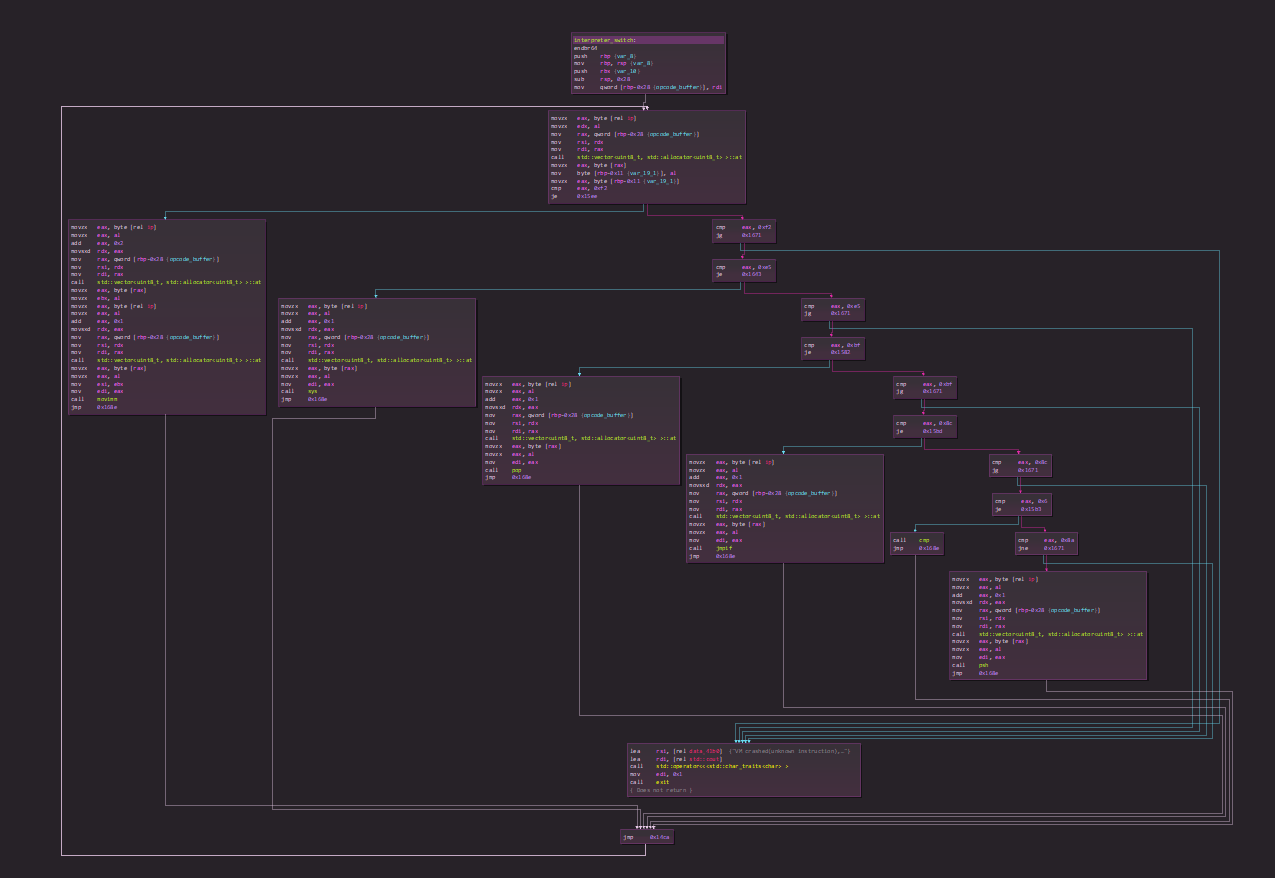[BTSCTF 2021 - RE] BtS emulator
The files can be found here.
Hi, I’m r0da.
Last day I did a CTF called BTSCTF, and a challenge called BtS emulator. As I’m still working on VMP virtualization currently, I’m kind good with VM stuff.
First I noticed that the binary has all its symbols in it, so easier to reverse. Then I saw that the dispatcher routine seems pretty clean.

We found the opcode related to it :
const uint8_t opcode_buffer[256] =
{
0xf2, 0x72, 0x45, 0x8a, 0x72, 0xf2, 0x72, 0x6e, 0x8a, 0x72, 0xf2, 0x72, 0x74, 0x8a, 0x72, 0xf2,
0x72, 0x65, 0x8a, 0x72, 0xf2, 0x72, 0x72, 0x8a, 0x72, 0xf2, 0x72, 0x20, 0x8a, 0x72, 0xf2, 0x72,
0x70, 0x8a, 0x72, 0xf2, 0x72, 0x61, 0x8a, 0x72, 0xf2, 0x72, 0x73, 0x8a, 0x72, 0xf2, 0x72, 0x73,
.....
}
After a bit we can find the VM structure :
uint8_t r1;
uint8_t r2;
uint8_t r3;
uint8_t sp;
uint8_t ip;
uint8_t ef;
std::vector<uint8_t> stack;
So from here, I directly started to reverse each handles to create a dissasembler (sorry for Windows tabs) :
void CMP() {
printf("CMP r1, r2\r\n");
ef += ((r1 - r2) != 0);
ip += 1;
}
void PUSH() {
printf("PUSH ");
uint8_t reg = opcode_buffer[ip + 1];
uint8_t reg_value = read_register(reg);
stack.push_back(reg_value);
sp = stack.size();
printf("\r\n");
ip += 2;
}
void POP() {
printf("POP ");
uint8_t reg = opcode_buffer[ip + 1];
uint8_t value = stack.back();
stack.pop_back();
write_register(value, reg);
printf("\r\n");
ip += 2;
}
void JMPIF() {
uint8_t offset = opcode_buffer[ip + 1];
printf("JMPIF 0x%x\r\n", offset);
(ef != 0) ? ip += 2 : ip = offset;
}
void MOVIMM() {
printf("MOVIMM ");
uint8_t value = opcode_buffer[ip + 2];
uint8_t target_reg = opcode_buffer[ip + 1];
write_register(value, target_reg);
printf("\r\n");
ip += 3;
}
void SYS() {
uint8_t imm = opcode_buffer[ip + 1];
printf("SYS 0x%x\r\n", imm);
switch (imm)
{
case 0x3c:
if (r1 == 0) {
printf("Correct Password\r\n");
}
else {
printf("Wrong Password\r\n");
}
exit(0);
break;
case 0:
if (stack.size() < r2 + r3) {
stack.resize(r2 + r3);
}
char input[256];
fgets(input, r3, __acrt_iob_func(r1));
for (size_t i = r2; i < r3; i++)
stack.push_back(input[i]);
ip += 2;
break;
case 1:
char output[256];
for (size_t i = r2; i < r3; i++)
output[i] = stack[i];
fwrite(output, 1, r3, __acrt_iob_func(r1));
ip += 2;
break;
default:
printf("[-] Fail to dispatch imm in SYS\r\n");
exit(1);
break;
}
}
After my reimplementation of each handlers, we can just execute the opcodes and see what it looks like:
MOVIMM r3 0x45 // push each byte of "Enter password"
PUSH
MOVIMM r3 0x6e
PUSH
...
MOVIMM r3 0xa
PUSH
MOVIMM r1 0x1 // stdout
MOVIMM r3 0xf // print len
SYS 0x1 // print "Enter password"
MOVIMM r1 0x0 // stdin
MOVIMM r3 0x19 // input flag len
SYS 0x0 // read for 0x19 char
MOVIMM r1 0x33 // get flag byte
POP r2 // get input char
CMP r1, r2 // compare it to input
MOVIMM r1 0x6c // repeat for each char of the flag...
POP r2
CMP r1, r2
...
JMPIF 0xf8 // jump if correct flag
MOVIMM r1 0x1
SYS 0x3c // print "Wrong Password"
From the code we can get the pass : c0rr3cth0r$38@tt3ry$t@pl3
And here is the flag for the server : BtS-CTF{WAIT_IT'S_ALL_ASSEMBLY??}
Pretty easy to be honest…
